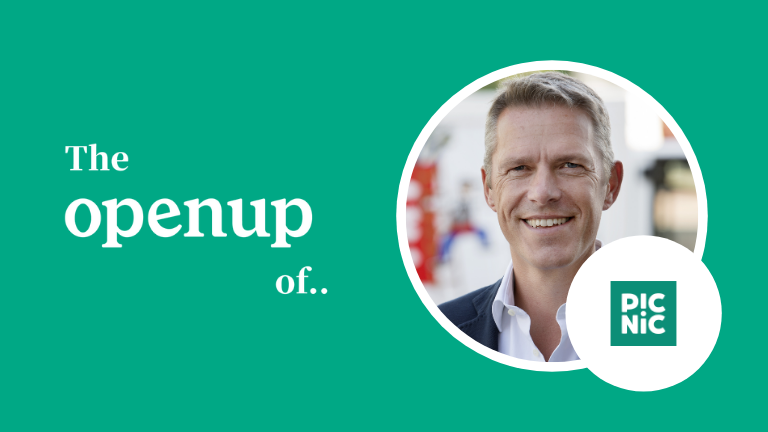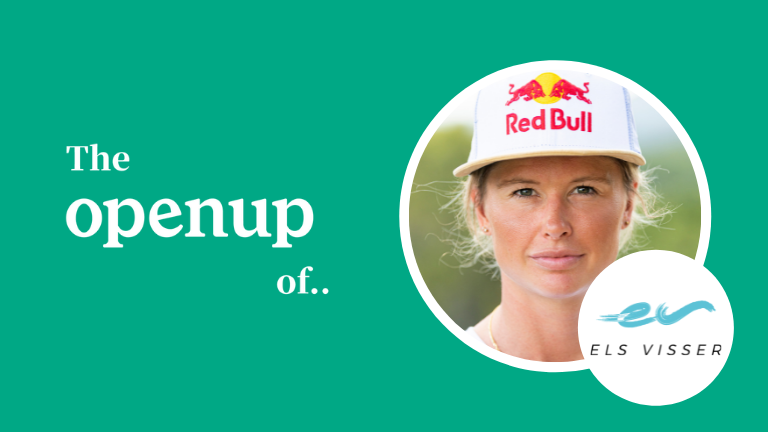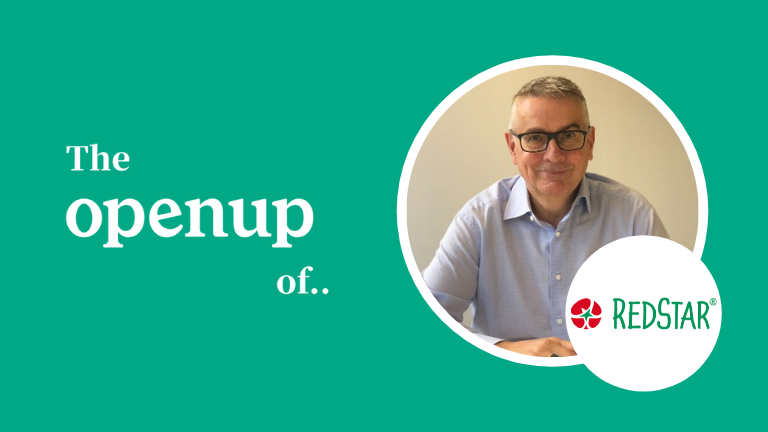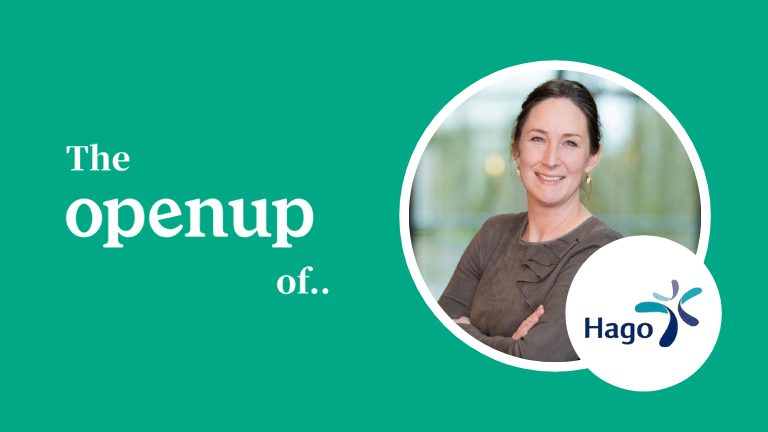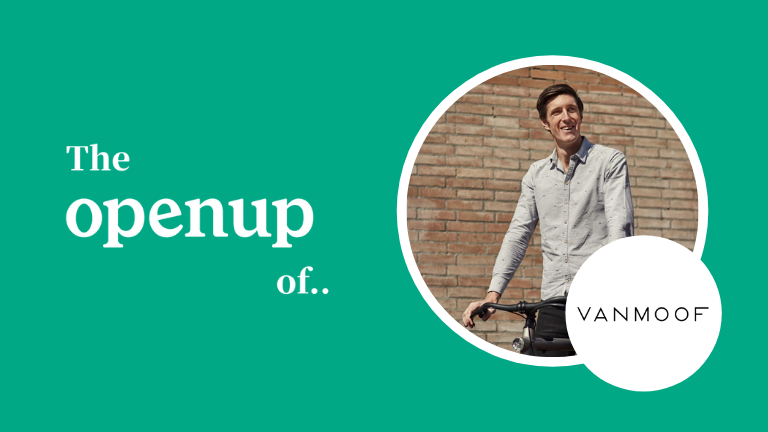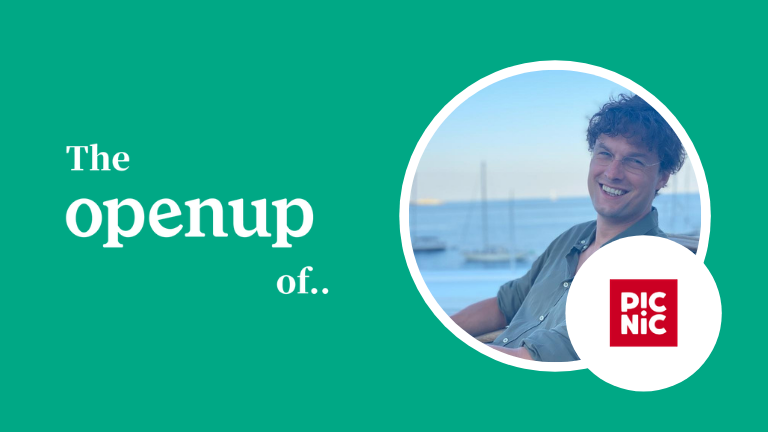In the section ‘The OpenUp of …’ someone openly tells about his or her life. Topics such as meaning, awareness, doubts and insights all pass by. And how does psychology play a role in their lives? In this episode we ask Picnic founder Michiel Muller.
How are you, Michiel?
“I’m fine, thank you. The past year was extremely busy and despite Corona luckily also with nice developments and activities which are good for my energy level. This week, for example, we celebrated our fifth anniversary with a gigantic live TV show and all kinds of smaller festivities. Furthermore there is a lot in development at Picnic, like our further expanson and a food forest, all beautiful projects from which I can draw a lot of positivity.
“As long as things don’t really derail, I can stay on top of things”
Is there a breaking point between a bit of pressure and being too busy for you? Does it sometimes get too much?
“Being busy is part of it and so is a lot of stress. I really enjoy working hard, as long as I can achieve something by doing so. If you ask me it only goes wrong when you get stuck in that stress for too long, when you can’t switch back to a relaxed state of mind. Stress can really build up, it can become too much if you can’t set your mind to relax as well, that’s the killer.
“My body tells me when to take a step back”
What do you do in these moments? How do you get back into relaxation?
“First I’ll take a look at my calendar. There are always things – especially in the evening – which can be shifted to tomorrow or later. By postponing these things I make sure that I have more time to relax. I can also really enjoy a long bike ride or a walk in the woods, a few hours offline is great when you’re always on, and always reachable for others. But I also find relaxation in the hustle and bustle of visiting friends and family. An evening out, going for dinner or a movie: it makes me happy to have people I care about around me. In that respect I cannot choose one single thing that helps me, but fortunately I don’t have to.
“It’s an art to be able to live in the moment”
Why do you believe mental health is an important part of your daily life?
“Actually, every person should have a mental coach, it is so important to be able to reflect. Having said this… I don’t have one, which is a pity sometimes. On the other hand, I do have a few valuable people around me with whom I can easily share. Amongst these people is of course my wife, but also family, friends, colleagues, people I meet outside of work, it can be anywhere. It’s important to express yourself and discuss things; you can learn lessons from life by sharing.
“We have to express ourselves, letting thoughts circle in our own head is not helpful.”
Taking a walk and not worrying for a while can break the circle, such as sharing your thoughts with another person. It does not always have to be about the big things. Simply naming what you are dealing with, ensures that it does not have to be a big thing. I have people around me who I trust, with whom it feels safe to share my thoughts. It’s okay to show that you are not perfect, because it will never be perfect.
It is nice to be on good terms with yourself, a positive image of yourself is a starting point for so much. I find it essential that you appreciate yourself enough and give yourself credit. Only then can you be open to others and become enthusiastic about new things. Being nice to yourself is a very important basis for me.”
How do you deal with challenging situations in your life?
“I’m lucky that I naturally see the glass half full rather than half empty, I got that positive view from an early age. Of course that doesn’t mean that I never worry. Situations that werequite impactful for me were the unjustified press that Picnic received that also involved our employees. That irritates, you have to defend yourself against something that doesn’t exist. It’s so below the belt and a lot of people who work for us were actually made fun of, I can really worry about that.
“I don’t worry about a lot of things, but injustice just doesn’t let me go.”
What are the most valuable lessons life has given you?
“To discuss concerns and listen to others is important to me. You already know your own answers to some questions and sometimes they don’t help, while another person can shine a completely new light on your situation. For example, I can worry about a certain message, while another person may not have seen it at all or may value it positively. By sharing and talking about it with others, you often get a different view of the situation and see alternative angles. You can only learn from that.
“Why would you give someone who frustrates you such a big role in your life?”
In addition, my experience has also shown me that you can’t or don’t always have to solve everything. Many things solve themselves eventually, sometimes something is beyond your control and sometimes you simply give it too much attention. A striking question I once heard someone ask: “Why do you give that person (or situation) such a big role in your life?” That’s what I found such a beautiful insight: you are bothered immensely by something or someone, why do you make it so big? You let the anger or frustration take over your thoughts, it is actually very strange that your brain does that.
In addition, I learned from one of my first bosses how important it is to give and receive feedback in a light, to-the-point and constructive way. By communicating directly and openly, you can deal with certain situations much better. Actually, there are only a few things we really need to worry about. The most beautiful statement in that context came from my children when they were still in high school. I came home with a story and when I told it, they sarcastically said: “Jep, that’s important dad!”. Lovely. They were absolutely right.”
